Speakers highlight hope that the Jefferson Forge will be a model for rural rivitalization
~by Victoria Riley, GreeneCountyNewsOnline
A brief ribbon cutting ceremony Saturday afternoon at Accenture’s Forge in Jefferson kicked off a grand opening celebration attended by hundreds of people from Jefferson, Greene County, across Iowa and across the country.
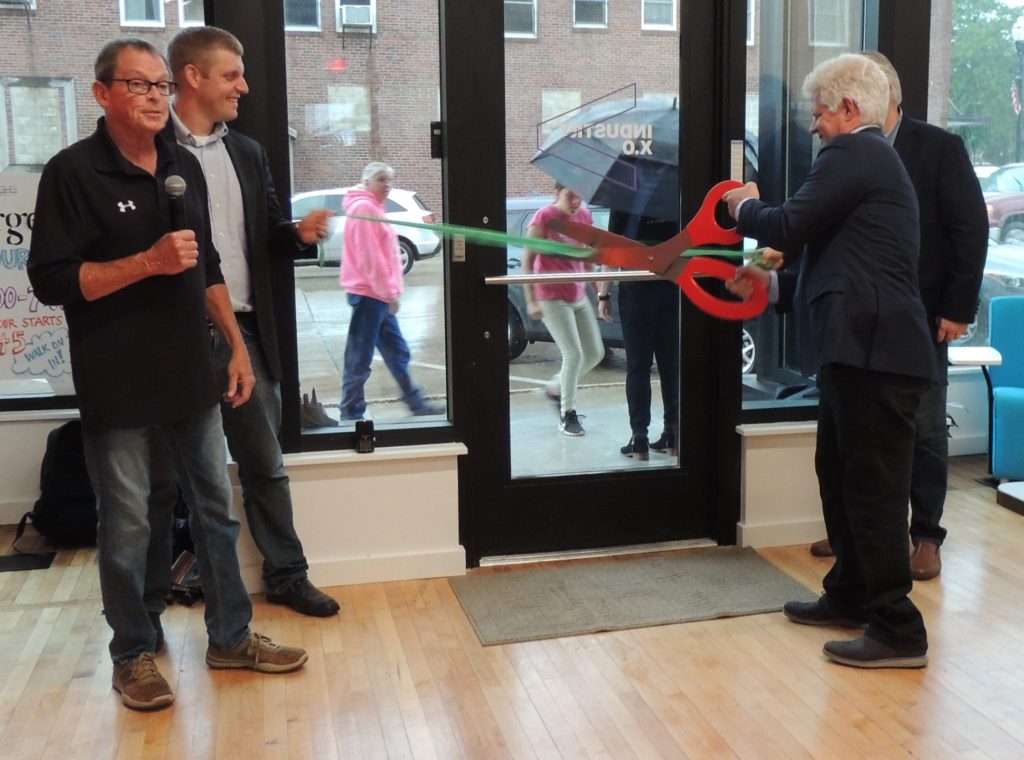
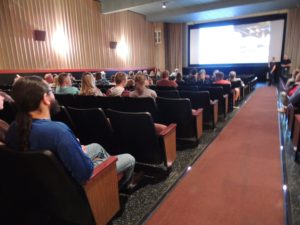
The ribbon cutting was followed by tours of the building and informational sessions in the Sierra Community Theatre targeting students, parents and school staff, about the opportunities available to learn computer software coding through Des Moines Area and Iowa Central community colleges and Accenture’s four-month training program.
Two informational sessions were held, with about 75 persons attending the first.
A treat for local residents was a virtual tour in the theatre’s lower level Business Centre of the regional career academy and new high school now under construction on North Grimmell Road at Highway 30. The virtual tour was created and hosted by OPN Architects, the company that designed the building.
Gov Kim Reynolds and Lt Gov Adam Gregg arrived in Jefferson in time to tour The Forge before the evening program.
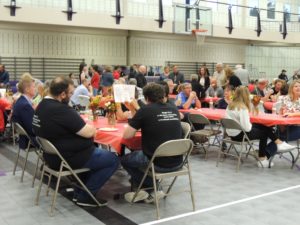
A community barbecue and the evening program, were planned to take place on the north lawn of the courthouse. They were moved to the Greene County Community Center due to rain.
Kroeger served as emcee for the program. He first credited Des Moines Area Community College and Iowa Central Community College for their collaboration in adding software development training in the span of only nine months.
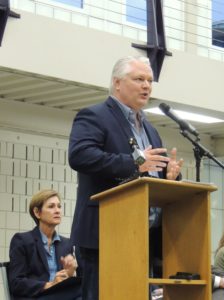
Kroeger compared the Lincoln Highway to bringing software development to rural towns. He said with the innovation of automobiles it became obvious the roads made for horses and buggies wouldn’t suffice. When Carl Fisher dedicated the Lincoln Highway in 1913, he named two goals: to build a coast-to-coast concrete highway(infrastructure needed for autos); and to stimulate the building of enduring highways.
The Lincoln Highway was funded by private and corporate donations. The highway built through the private-corporate partnership led eventually to the modern day federal interstate highway system.
Kroeger sees the Jefferson Forge as providing the infrastructure needed to create the digital innovations of tomorrow, as well as providing a model – like the Lincoln Highway was a model – to revive, rebuild and restore other rural communities.
Of all the speakers, Congressman Ro Khanna (D) said the least but conveyed the importance of The Forge opening as it offers hope to the country.
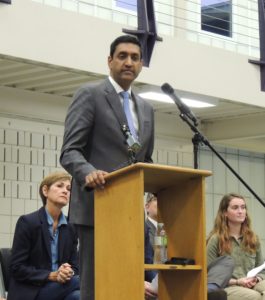
He represents California’s 17th Congressional District, which is composed primarily of Silicon Valley. He is a national leader in rural revitalization, advocating for tech industry jobs in rural America. He has visited Jefferson before and has been in close contact with Kroeger in developing the Jefferson Forge.
Khanna said that when the history of America’s technology leadership is written, Silicon Valley will be mentioned, but two chapters will mention Iowa. One, Khanna said, will be about John Atanasoff inventing the first computer in Ames. “The second will be about Linc Kroeger and Chris Deal and Jefferson for having cracked the code for technology to rural America.”
“What you’re doing here matters a lot,” he said. “It matters because some of the kids here are going to get to stay here and be able to live their dreams without having to move.
“It matters because, being in Washington these days, it seems like so much is negative in our country. So much is divisive. What you’re offering this country is a model of hope. You’re offering a sense of helping stitch us back together because the tech companies aren’t here out of charity. They’re here because they recognize this is a partnership where you have people who have great work values, a great education, an extraordinary community college system.
“If we can do this in Jefferson, Iowa, think if we can replicate this around the country, around the state, and in other rural communities….This is how we’re going to win in the 21st Century. This is how America stays ahead in technology.”
Khanna is the son of immigrants. He said someone told him in college he could never be elected to office in America. “But his country thought different. At the age of 40, they elected me to represent arguably the most economically powerful district in the world. Our nation is still a land where dreams are more possible than anywhere in the world. And Jefferson, Iowa, is reminding us of that.”
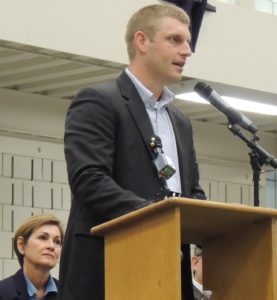
Chris Deal of Jefferson, the man who first suggested Kroeger build a Forge in Jefferson, spoke early in the program.
He said thanking all the people involved in bringing Accenture and The Forge to Jefferson is the first “Insurmountable challenge” of the project. He thanked Kroeger and Accenture for the vision to build a rural Forge and choosing Jefferson and Greene County as a partner.
He thanked the Greene County Community Schools and both community colleges for “thinking outside of the box”; financing partners USDA through Midland Power Cooperative and the Iowa Area Development Group, the state of Iowa through the Iowa Economic Development Authority, the city of Jefferson, Greene County Development Corporation and Home State Bank; Jefferson Telecom for its progressive approach to infrastructure; the design, engineering and construction teams that carried out the renovation of the 1904 Odd Fellows Hall; local volunteers and specifically Nick Sorensen and Peg Raney; and his family. “I am beyond blessed to have them in my life,” he said about his family.
He thanked the entire community and mentioned April 3, 2018, as the day of the successful bond referendum for the career academy and high school. He said that project provided the support and backbone for bringing Accenture to the community.
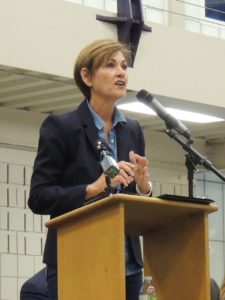
Gov Kim Reynolds followed Deal. She said when she’s part of discussions about work-based learning, STEM education, building America’s workforce, or good things we happening in our small towns, “I always, always, talk about Jefferson and The Forge and the great things you have going on.”
She called The Forge “a launch pad for careers, a hub for lifelong learning, and a model for small towns all across our state and across this country.”
“Rural Iowa stands at the crossroads of a digital revolution and we’re working every single day to harness its power, to fuel a rural renaissance in small towns across our state,” Reynolds said.
She also called The Forge “a shining example of what’s possible when shared vision meets drive and ambition. Our brand of collaboration has dynamic private-public partnerships as its trademark, and this community knows how to build relationships that matter. I see it every time I’m in Greene County.”
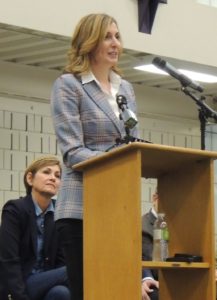
Debra King, senior vice president and chief information officer of Corteva Agriscience (formerly a division of DowDuPont, now a stand-alone company as of June 1) said the purpose of a rural Forge aligns with Corteva’s purpose – to enrich the lives of those who produce and those who consume, ensuring progress for generations to come.
Corteva is looking for employees with a rural perspective. For that reason, the company has provided $187,500 for 25 scholarships to Des Moines Area Community College’s computer learning program, a pipeline to the training program at The Forge.
Corteva also plans to offer internships and entry level positions in Iowa.
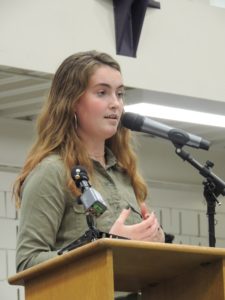
Regan Lamoureux, a 2018 Greene County graduate and now a sophomore computer science major at the University of Iowa, told of her experiences with The Forge. She said she hadn’t thought of a career in technology until she took a coding class her senior year to fill in an empty period in her class schedule. She did a job shadow at The Forge in Des Moines, “It was an eye-opening experience to see what a career in the tech field would look like,” she said.
After going to Iowa City, she stayed in touch with Kroeger and stayed abreast of progress on the Jefferson Forge. That led to an internship at the Chan Zuckerberg Initiative’s bio hub in San Francisco this past summer. “I learned about areas of science I’d never even heard of. It all started because of opportunities right here in Greene County,” she said. “These are opportunities any student at Greene County can take advantage of that they wouldn’t have had previously.”
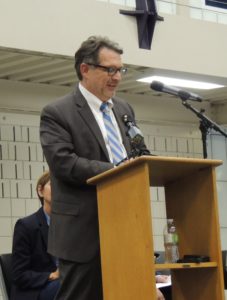
Will Castleberry, Facebook vice president of US, state and local policy, spoke next. Through Facebook’s Altoona facility, the company has invested $1 billion in Iowa. “We’re committed to providing Iowans the skills and tools they need to flourish in an increasingly digital economy,” he said.
Facebook has made 80 community action grants to Iowa schools for STEM programs and other projects, and has a partnership with DMACC in Carroll in digital skills and marketing training.
Castleberry announced Facebook is expanding its scholarship opportunities for students who want to complete a program in digital skills and marketing, and its adding 1:1 career training and job placement for people who complete the program. ‘Our hope is be working with you and the people on the stage we can help people get the skills they need to thrive,” he said.
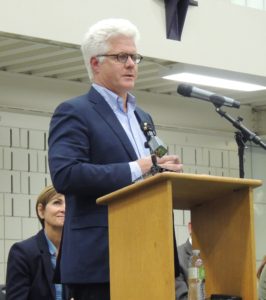
Chad Jerdee, Accenture’s global lead for responsible business sustainability and corporate citizenship, was the last to speak. In introducing him, Kroeger explained that as a Pillar Technology employee, his work toward establishing a rural Forge wasn’t part of his assigned job duties; he did it on nights and weekends.
When Accenture purchased Pillar Technology Jerdee allowed him to pursue his idea of rural Forges as rural revitalization fulltime. Kroeger also said the division Jerdee leads, responsible business sustainability and corporate citizenship, is new to Accenture as of Sept. 1.
He thanked Gov Reynolds and Congressman Khanna for “their continued leadership and recognition of the economic and educational impacts that technology and tech skills can have on our communities, particularly those away from an urban center. The future of work in rural America is important to all Americans and it’s encouraging to see this bipartisan collaboration. We’re very proud to be a part of it,” Jerdee said.
According to Jerdee, manufacturing in the future will dramatically increase demand for people with software and tech skills. That will make American business more competitive globally and create jobs for Americans. Workers will need education and training required to fill digital economy jobs now and in the future. He sees potential in developing rural worksites to keep the talent pipeline filled, and that the partnership with DMACC and Iowa Central are important to feeding the pipeline into the Forge Academy.
